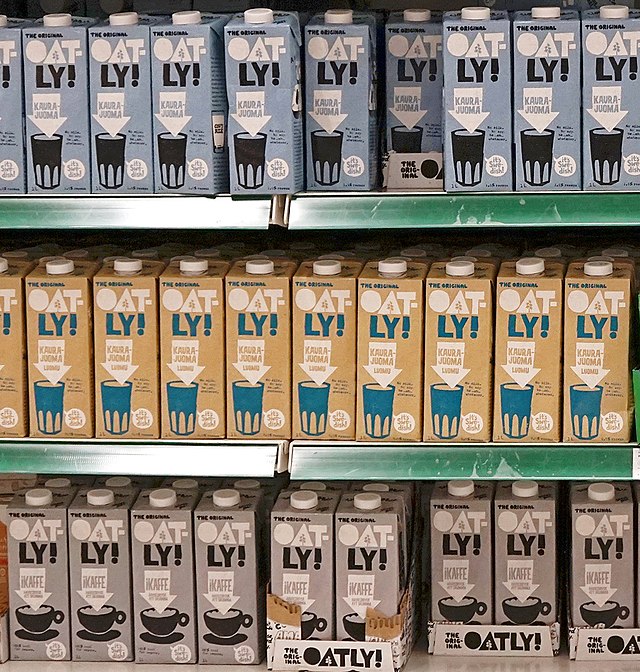An Oatly campaign that took over ads on Dublin transportation and billboards starting in January has ignited a significant amount of controversy for its inflammatory marketing strategy that capitalises on the shaming of dairy consumers.
Over the past 10 years, consumers around the globe and even in Ireland, a country with a robust dairy industry, have been turning to plant based alternatives for dairy products. There are many explanations for this, including the rise in vegan lifestyles, increasing environmental consciousness, and frankly, the trendiness of non-dairy milks.
“In the past few years oat milk has massively increased in popularity, as a creamier and more environmentally sound option.”
Though almond, soy, and other milk alternatives are all relatively popular, in the past few years oat milk has massively increased in popularity, as a creamier and more environmentally sound option, with Oatly dominating a large portion of the market. Oatly’s new brand campaign in Dublin has utilised the slogan “it’s like milk but made for humans,” a jibe at cow milk being intended for cows to feed calves rather than people.
The strategy makes sense, in a way. It forces people to give a second thought to the milk option they’re choosing and even reevaluate their consumption of dairy as a whole. But that’s a lot to ask from someone standing in Tesco, picking which milk to put in their cereal.
Brand advertising campaigns like this do have good intentions, don’t get me wrong. A big concern with this Oatly campaign and others like it, though, is that it alienates the very people they aim to market to.
Veganism is the butt of many jokes, mostly because of the stereotypes that underlie the movement. Many meat eaters view vegans as militant, aggressive and hostile to people due to efforts to convert others to veganism. This perceived holier than thou stance is the reason many people are turned off from becoming vegan or vegetarian themselves, or even experimenting with plant based products, fearing they are being turned over to a cult of plants and tofu.
Take People for the Ethical Treatment of Animals (PETA), who are notorious for causing controversy as a result of their inflammatory animal rights campaigns that have ranged from portraits of nude celebrities to protest fur to insulting Steve Irwin only days after his death. Oatly’s campaign isn’t as extreme, but it’s an unfriendly callback to these more antisocial tactics of promoting animal welfare.
In reality, the vast majority of vegans and vegetarians are normal and accepting, understanding that small movements to push people towards more ethical and environmental lifestyles go a lot further than hostility.
But campaigns like Oatly’s do not do great justice to that reality. By calling oat milk “milk for humans”, Oatly is pinning non-vegans as strange and inhuman, an accusation that polarises those same people they wish to appeal to, potentially solidifying them as anti-vegans for good.
There is a similar situation for many slow fashion brands and fast fashion critics, who aim to turn people away from fast fashion brands through guilt and shaming tactics, which only incites consumers to double down on their Shein purchasing habits, feeling as though they are being singled out and targeted for what is often a decision of convenience.
Now, don’t get me wrong, brands going political is not always a bad thing and it is oftentimes perceived in a great light. Campaigns from Nike standing with Colin Kaepernick in the wake of him taking a knee to Ben and Jerry’s pulling sales from Israel have been met with decent amounts of backlash, but overall increased popularity for the brand.
“It’s pretty obvious that Oatly would support the plant-based movement, they’re an oat milk brand after all, so the excess flaming of their potential customers makes no sense and doesn’t reinforce the brand’s political message.”
The critical thing with these campaigns is they aren’t making people feel targeted for the individual decisions they make, only endorsing human rights based causes. While most people can support a political movement to empower a minority group or stand up to injustice, it’s a bigger stretch to get people behind a cause that regularly impacts their day to day decisions. It’s pretty obvious that Oatly would support the plant-based movement, they’re an oat milk brand after all, so the excess flaming of their potential customers makes no sense and doesn’t reinforce the brand’s political message.
Oatly, I’m on your side. Most of us are. People who genuinely have no desire to be more ethical or environmental in their consumption of food products are few and far between. But aggressive and accusatory marketing campaigns aren’t going to convert the masses to non dairy milks.
Tap into the existing trends with non dairy milks. Further a mission of making it the “cool new thing” in coffee shops. Launch marketing campaigns that make people feel good about making a change, like the carbon footprint impact of switching to Oatly for a month, not ones that shame them for decisions they’ve already made.
We’re currently in a cost of living crisis, and more than that, a world where it feels like every little decision you make carries extreme weight. Next time someone is standing in Tesco picking the milk for their cereal, don’t make them feel forced to pick Oatly, make it feel empowering and fun, and you’ll start to see the masses turn.






